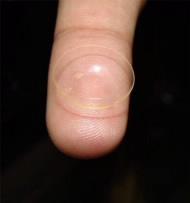Home > Press > Contact lenses loaded with vitamin E may treat glaucoma
 |
| Contact lenses containing vitamin E like the one above can treat glaucoma, the second leading cause of blindness, and other eye conditions, scientists are reporting. Credit: Anuj Chauhan, Ph.D. |
Abstract:
The popular dietary supplement vitamin E, loaded into special medicated contact lenses, can keep glaucoma medicine near the eye — where it can treat that common disease— almost 100 times longer than possible with current commercial lenses, scientists reported here today.
Contact lenses loaded with vitamin E may treat glaucoma
Washington, DC | Posted on March 29th, 2010In a presentation at the 239th National Meeting of the American Chemical Society (ACS), they described use of vitamin E to develop contact lenses that may deliver more medication for glaucoma and perhaps other diseases to the eye.
Anuj Chauhan, Ph.D., who headed the research team, explained that glaucoma is second only to cataracts as the leading cause of vision loss and blindness in the world. It affects almost 67 million people. Eye drops that relieve the abnormal build-up of pressure inside the eye that occurs in glaucoma, are a mainstay treatment.
Chauhan and colleagues have developed a new extended-release delivery approach incorporating vitamin E into contact lenses. The invisible clusters, or aggregates, of vitamin E molecules form what Chauhan describes as "transport barriers." that slow down the elusion of the glaucoma medication from the lens into the eye. The drug released from the lens into the eye stays in the tears far longer than the 2-5 minutes with eye drops, leading to more effective therapy.In research with laboratory animals, the lenses containing vitamin E nanobricks administered drugs up to 100 times longer than most commercial lenses. The lenses could be designed for continuous wear for up to a month, Chauhan said.
####
About American Chemical Society
ACS is a congressionally chartered independent membership organization which represents professionals at all degree levels and in all fields of chemistry and sciences that involve chemistry.
For more information, please click here
Contacts:
Science Inquiries:
Michael Woods
Editor
202-872-6293
General Inquiries:
Michael Bernstein
202-872-6042
Copyright © American Chemical Society
If you have a comment, please Contact us.Issuers of news releases, not 7th Wave, Inc. or Nanotechnology Now, are solely responsible for the accuracy of the content.
| Related News Press |
News and information
![]() Researchers develop molecular qubits that communicate at telecom frequencies October 3rd, 2025
Researchers develop molecular qubits that communicate at telecom frequencies October 3rd, 2025
![]() Next-generation quantum communication October 3rd, 2025
Next-generation quantum communication October 3rd, 2025
![]() "Nanoreactor" cage uses visible light for catalytic and ultra-selective cross-cycloadditions October 3rd, 2025
"Nanoreactor" cage uses visible light for catalytic and ultra-selective cross-cycloadditions October 3rd, 2025
Possible Futures
![]() Spinel-type sulfide semiconductors to operate the next-generation LEDs and solar cells For solar-cell absorbers and green-LED source October 3rd, 2025
Spinel-type sulfide semiconductors to operate the next-generation LEDs and solar cells For solar-cell absorbers and green-LED source October 3rd, 2025
Nanomedicine
![]() New molecular technology targets tumors and simultaneously silences two ‘undruggable’ cancer genes August 8th, 2025
New molecular technology targets tumors and simultaneously silences two ‘undruggable’ cancer genes August 8th, 2025
![]() New imaging approach transforms study of bacterial biofilms August 8th, 2025
New imaging approach transforms study of bacterial biofilms August 8th, 2025
![]() Cambridge chemists discover simple way to build bigger molecules – one carbon at a time June 6th, 2025
Cambridge chemists discover simple way to build bigger molecules – one carbon at a time June 6th, 2025
![]() Electrifying results shed light on graphene foam as a potential material for lab grown cartilage June 6th, 2025
Electrifying results shed light on graphene foam as a potential material for lab grown cartilage June 6th, 2025
Announcements
![]() Rice membrane extracts lithium from brines with greater speed, less waste October 3rd, 2025
Rice membrane extracts lithium from brines with greater speed, less waste October 3rd, 2025
![]() Researchers develop molecular qubits that communicate at telecom frequencies October 3rd, 2025
Researchers develop molecular qubits that communicate at telecom frequencies October 3rd, 2025
![]() Next-generation quantum communication October 3rd, 2025
Next-generation quantum communication October 3rd, 2025
![]() "Nanoreactor" cage uses visible light for catalytic and ultra-selective cross-cycloadditions October 3rd, 2025
"Nanoreactor" cage uses visible light for catalytic and ultra-selective cross-cycloadditions October 3rd, 2025
|
|
||
|
|
||
| The latest news from around the world, FREE | ||
|
|
||
|
|
||
| Premium Products | ||
|
|
||
|
Only the news you want to read!
Learn More |
||
|
|
||
|
Full-service, expert consulting
Learn More |
||
|
|
||








